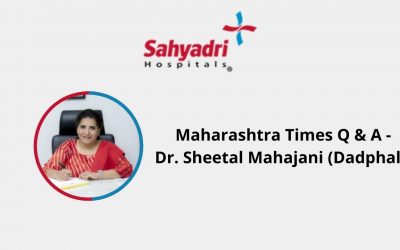अॅसिडिटीला प्रतिबंध कसा करावा
आपण आतापर्यंत छातीत जळजळ होत असल्याची किंवा अॅसिडिटीची समस्या असल्याची तक्रार करणार्या अनेक व्यक्ती पाहिल्या असतील.मात्र अॅसिडिटी म्हणजे नक्की काय आणि ती कशी होते याबद्दल तुम्ही कधी विचार केला आहे का? आपल्याला ते समजावून घेणे आवश्यक आहे.
वर्ल्ड हेपॅटायटिस डे 28 जुलै 2022
भारतात यकृताच्या आजारांमध्ये लक्षणीय वाढ होत असताना, योग्य प्रतिबंधात्मक उपायांनी या आजारांना दूर ठेऊ शकतो, याबाबत अधिकाधिक जागृती होणे महत्त्वाचे आहे, असे मत तज्ज्ञांनी व्यक्त केले आहे.
Maharashtra Times Q & A – Dr Sheetal Mahajani (Dadphale)
यकृताच्या आजाराच्या उपचारांमध्ये आहार हा महत्त्वपूर्ण घटक असतो. अशा व्यक्तींनी समतोल आहार घ्यावा. त्यामध्ये प्रथिनेयुक्त आहाराबरोबर दिवसभर काम करण्यासाठी उर्जा मिळविण्यासाठी मर्यादित प्रमाणात कार्बोहायड्रेट व चरबीयुक्त प्रकारातील पदार्थांचा समावेश असावा. यकृताचा कोणत्या प्रकारातील आजार झाला आहे,यावर आहार अवलंबून असतो.
Hepatitis Can’t Wait
While Covid -19 has impacted treatment of almost all ailments, the sheer magnitude of hepatitis affected people calls for increased awareness and action for early diagnosis and treatment. World Hepatitis Day is observed every year on 28 July and this year the theme is ‘Hepatitis Can’t Wait’.
यकृतावरील उपचार
यकृताच्या आजारांवरील उपचार ४ प्रकारात विभागता येतील- 1. अचूक निदान करून, निदाना प्रमाणे उपचार करणे . 2. यकृताच्या आजारामुळे ओढविणाऱ्या गुंतागुंतीचा उपचार. 3. अंतिम टप्प्यातील यकृताच्या आजारासाठी यकृत प्रत्यारोपण. 4. जीवनशैलीत करावयाचे बदल.
नॉन अल्कोहोलिक फॅटी लिव्हर – एनएएफएलडी
या आजारात चयापचयाच्या क्रियेत बाधा झाल्याने यकृतामध्ये मेदाचे प्रमाण वाढते आणि चरबी प्रमाणाबाहेर आढळते. यामध्ये सुरुवातीला फॅटी लिव्हर होते आणि नंतर हिपॅटायटिस,फायब्रोसिस होतो आणि कालांतराने सिऱ्होसिसची बाधा होते. बदलत्या जीवनशैलीमुळे ओढविलेला हा आजार आहे. स्थूलता, बैठी जीवनशैली,फास्ट फूड चे सेवन, मधुमेह, रक्तातील वाढलेले मेदाचे प्रमाण या आजाराचे मूळ कारण समजले जाते. ९ ते ३२ % जनसामान्यांमध्ये हा फॅटी लिव्हरचा आजार आढळतो. वजन कमी केल्यास आणि योग्य जीवनपद्धती अवलंबल्यास फॅटी लिव्हर पूर्ववत होऊ शकते.





